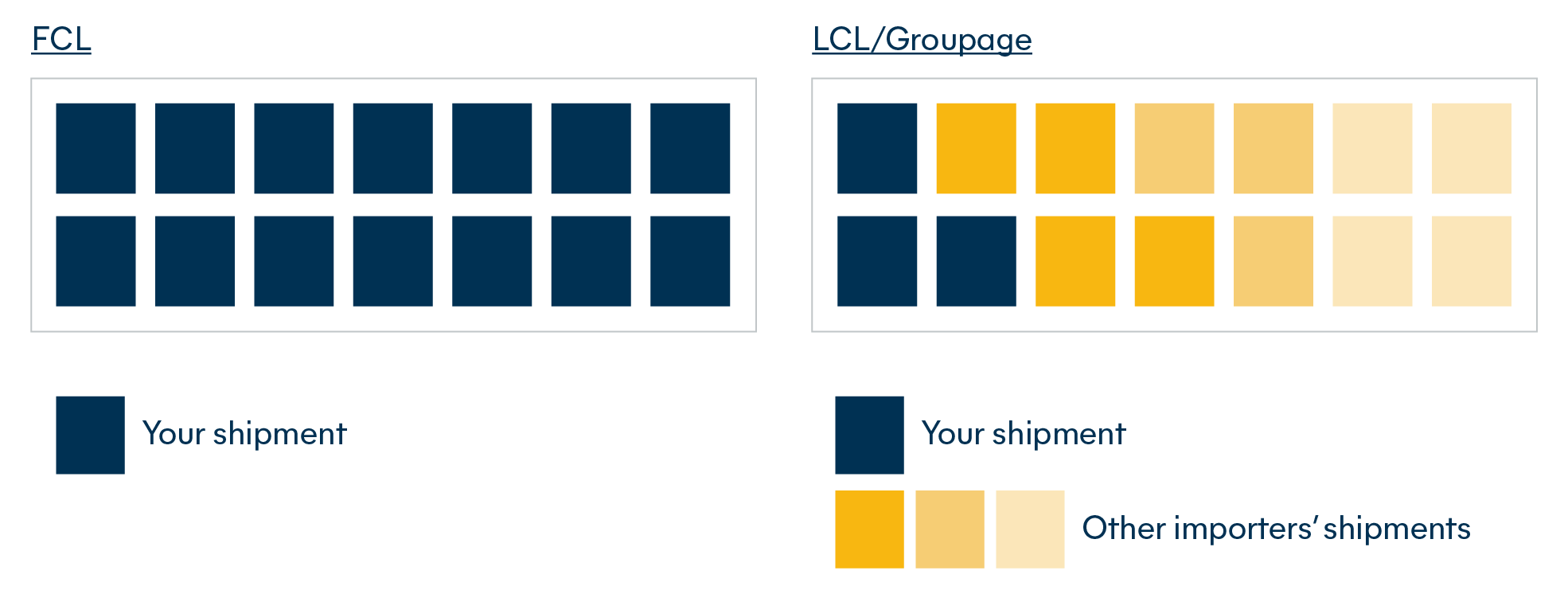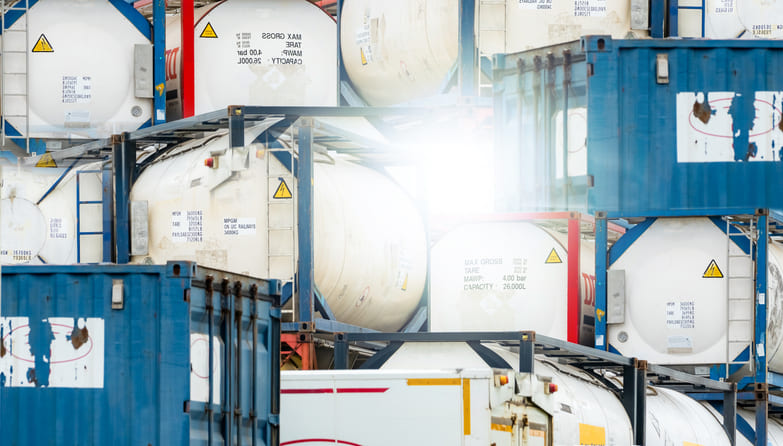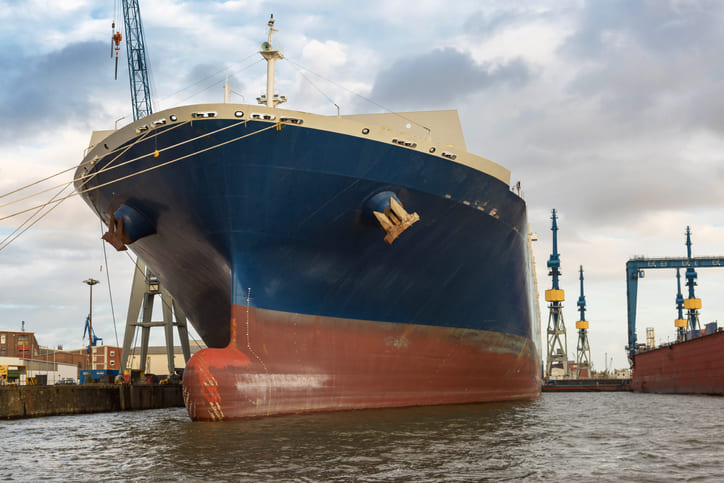FCL vs. LCL Container: Choosing the Best Shipping Option
A question that we’re frequently asked as a freight forwarder is, “Which container shipping method should I choose? FCL or LCL container shipping?”
The answer is not that one choice is inherently superior to the other. It’s more about which suits client needs and specific shipment requirements. Before we dive in, let’s briefly distinguish the terms FCL, LCL and groupage.
What is an FCL container?
As the name suggests, an FCL (full container load) is exactly that. Your products are the exclusive occupants of your container during shipment, for which you pay a lump sum.
The benefits of choosing FCL include:
Less risk of damage
Less handling time
Direct shipping
FCL shipments are loaded at the supplier’s warehouse and delivered straight to the recipient’s warehouse.
That means uninterrupted transport without any intermediary consolidation needed. More simplistically, an FCL container load is defined as one shipper to one receiver.
A container combined with cargo from multiple shippers to one receiver is called consolidation.
What is a LCL container and groupage?
With an LCL (less than container load), the amount of cargo you have to ship is not enough to fill an entire container, so your pallets are co-loaded in a shared container with other cargo.
Freight costs typically depend on how many pallets you are shipping.
So what’s the difference between LCL and groupage?
The answer is the transport providers. LCL container services are provided by companies known as co-loaders or consolidators.
These operators do not have a direct relationship with the freight payer and co-load pallets of all types of goods to fill the container. Whereas groupage is provided by freight forwarders like Hillebrand, and we only load your pallets with other beverage products.
Groupage service providers operate warehouses where they combine cargo from several exporters, ship, deconsolidate the FCL and deliver to multiple receivers.

LCL container or groupage vs. FCL container: Which is better?
It depends on your need for each shipment. But most of the decision will be based upon the volume of cargo you need and/or want and cash flow availability.
The benefits of groupage and LCL container shipments include cost-effectiveness and the ability to choose the exact volume required for transport without waiting for enough product to fill a full container before shipping. The total freight cost for transporting a pallet is cheaper to ship than a full container if that is the amount of product needed at the destination.
On the other hand, the total freight cost per pallet is cheaper if you have enough product to fill a full container.
When it comes to how urgently you need your products to arrive at the destination, FCL container shipping is generally the best option if you want your product to reach the destination as quickly and with as little handling as possible.
LCL container shipping, on the other hand, is ideal for shipments with a longer lead time or more flexible time frames.
Cash flow benefits of groupage
Groupage offers major wins for the importer in terms of cash flow, as forecasting and planning are easier with fixed and regular transport departure schedules.
Let’s consider the wine and alcoholic beverage industry as one example. A full container shipment of 10 pallets (20-foot container) holds around 900 dozen-bottle cases.
That means hundreds of bottles (and their associated cash value) will be sitting idly in a warehouse when the sale of that product is slow and at risk of being unsellable or a less favourable purchase if a new label or vintage were to be introduced for example. First, this is now “dormant” money, having been taken out of a company’s cash flow and tied up in stock.
Second, temperature-controlled warehouse storage is pricey; insurance and other associated costs quickly add up each month. Third, if cold storage is not possible, the bottles will be subject to fluctuating and unregulated temperatures, which can cause the wine to diminish in its quality.
So depending on the capabilities, storage and sales demand at the destination, smaller wine shipments of bottles could be moved more frequently than one full load to minimise warehouse storage time and allowing funds to finance future groupage shipments. Moreover, less upfront capital is required.
Cash flow is not tied up in warehoused products, and fewer taxes and duties are needed to be paid since the total value being transported is less. In our wine shipping example, shipping five affordable shipments of two pallets, each holding 60 cases of 12 bottles, makes more economic sense for a client that doesn’t want to overstock their warehouse, as well as saving total shipping costs.
From a consumer point of view, it also allows the seller to react to market trends quicker by changing the product on offer if there isn’t a vast amount in stock that needs to be sold before a new range can be available.
Here’s an example.
You sell two pallets of a specific wine each month.
One FCL of 10 pallets means you’ll be paying warehouse costs for five months until all the pallets are sold, tying up cash in 10 pallets of stock. Five groupage shipments of two pallets significantly reduce storage costs, and if planned well, the longer transit time can be counted as “free storage” while en route.
If you’re unsure which service is the right option, just ask. We’re here to help you make the right decision for your business and your cargo.
Hillebrand’s beverage-only groupage service
Hillebrand provides an attractive groupage offer tailored to the wine and spirits industry.
Due to the product’s sensitivity, our integrated service covers:
Door-to-door loading and delivery
Bonded warehouse operation
Competitive rates
Priority booking on cargo vessels
With Hillebrand, cargo can be packed in insulated containers and temperature-controlled warehouses, so alcoholic beverages are kept at optimal conditions throughout their freight journey. As a specialist in transporting wine and other cargo that requires special care, we undertake all aspects of documentation and customs paperwork required to comply with local and global legislation and regulation.
Moreover, our comprehensive cargo transport insurance policy covers the potential risks associated with sensitive product movements, and your groupage shipments can be tracked live through the myHillebrand app.
With our beverage-only groupage service, you can enjoy fixed and frequent departures on multiple shipping routes to maintain a lean inventory, manage a better cash flow and preserve quality freshness.
Read more about Hillebrand’s beverage-only groupage service here.
Or contact our team of experts to discuss your groupage shipping needs.

.png?sfvrsn=74cbe793_1)



